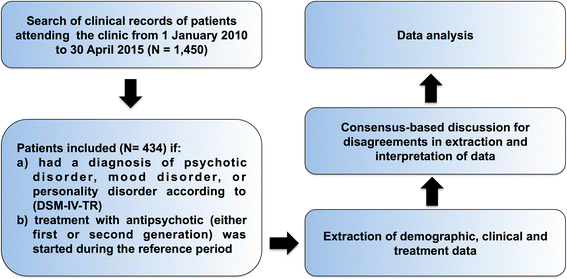Clinicians' adherence to clinical practice guidelines for cardiac function monitoring during antipsychotic treatment: a retrospective report on 434 patients with severe mental illness
- PMID: 28359306
- PMCID: PMC5374645
- DOI: 10.1186/s12888-017-1289-z
Clinicians' adherence to clinical practice guidelines for cardiac function monitoring during antipsychotic treatment: a retrospective report on 434 patients with severe mental illness
Abstract
Background: Severe mental illness (SMI) has considerable excess morbidity and mortality, a proportion of which is explained by cardiovascular diseases, caused in part by antipsychotic (AP) induced QT-related arrhythmias and sudden death by Torsade de Point (TdP). The implementation of evidence-based recommendations for cardiac function monitoring might reduce the incidence of these AP-related adverse events. To investigate clinicians' adherence to cardiac function monitoring before and after starting AP, we performed a retrospective assessment of 434 AP-treated SMI patients longitudinally followed-up for 5 years at an academic community mental health center.
Methods: We classified antipsychotics according to their risk of inducing QT-related arrhythmias and TdP (Center for Research on Therapeutics, University of Arizona). We used univariate tests and multinomial or binary logistic regression model for data analysis.
Results: Univariate and multinomial regression analysis showed that psychiatrists were more likely to perform pre-treatment electrocardiogram (ECG) and electrolyte testing with AP carrying higher cardiovascular risk, but not on the basis of AP pharmacological class. Univariate and binomial regression analysis showed that cardiac function parameters (ECG and electrolyte balance) were more frequently monitored during treatment with second generation AP than with first generation AP.
Conclusions: Our data show the presence of weaknesses in the cardiac function monitoring of AP-treated SMI patients, and might guide future interventions to tackle them.
Keywords: ECG; Electrolytes; Excess mortality; Side effects; Torsade de point.
Figures
Similar articles
-
[Drawing up guidelines for the attendance of physical health of patients with severe mental illness].Encephale. 2009 Sep;35(4):330-9. doi: 10.1016/j.encep.2008.10.014. Epub 2009 Jul 9. Encephale. 2009. PMID: 19748369 French.
-
QTc prolongation with antipsychotics: is routine ECG monitoring recommended?J Psychiatr Pract. 2014 May;20(3):196-206. doi: 10.1097/01.pra.0000450319.21859.6d. J Psychiatr Pract. 2014. PMID: 24847993 Review.
-
[Psychiatrists' decision making and monitoring of antipsychotic prescription for elderly schizophrenia patients].Encephale. 2016 Apr;42(2):124-9. doi: 10.1016/j.encep.2015.05.004. Epub 2016 Jan 12. Encephale. 2016. PMID: 26796558 French.
-
[Cardiological monitoring of antipsychotic-treated patients: evaluation and evolution of a hospital protocol].Encephale. 2008 Oct;34(5):467-76. doi: 10.1016/j.encep.2007.06.009. Epub 2007 Dec 26. Encephale. 2008. PMID: 19068335 French.
-
Cardiovascular safety of antipsychotics: a clinical overview.Expert Opin Drug Saf. 2016 May;15(5):679-88. doi: 10.1517/14740338.2016.1161021. Epub 2016 Apr 1. Expert Opin Drug Saf. 2016. PMID: 26934282 Review.
Cited by
-
Use of Electrocardiogram Monitoring in Adult Patients Taking High-Risk QT Interval Prolonging Medicines in Clinical Practice: Systematic Review and Meta-analysis.Drug Saf. 2022 Oct;45(10):1037-1048. doi: 10.1007/s40264-022-01215-x. Epub 2022 Aug 10. Drug Saf. 2022. PMID: 35947343 Free PMC article.
-
Estimation of cardiac QTc intervals in people prescribed antipsychotics: a comparison of correction factors.Ther Adv Psychopharmacol. 2022 Jun 16;12:20451253221104947. doi: 10.1177/20451253221104947. eCollection 2022. Ther Adv Psychopharmacol. 2022. PMID: 35747226 Free PMC article.
-
Identification and management of cardiometabolic risk in subjects with schizophrenia spectrum disorders: A Delphi expert consensus study.Eur Psychiatry. 2021 Jan 8;64(1):e7. doi: 10.1192/j.eurpsy.2020.115. Eur Psychiatry. 2021. PMID: 33413701 Free PMC article.
References
MeSH terms
Substances
LinkOut - more resources
Full Text Sources
Other Literature Sources
Medical


